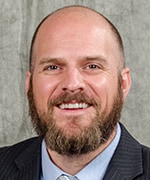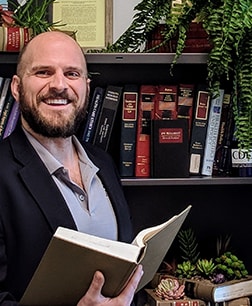


Profile in Public Health Law: Interview Cason Schmit, JD |
| Research assistant professor, Texas A&M University, Department of Health Policy and Management Title: Research assistant professor, Texas A&M University, Department of Health Policy and Management Education: Arizona State University, Sandra Day O’Connor College of Law, JD Public Health Law News (PHLN):Please describe your career path, what drew you to public health law and, more specifically, public health management and policy. Schmit:Like many other first year law students, I couldn’t tell you what public health was. I only hoped to use my law degree to do “good,” whatever that meant. While at Arizona State, three professors in particular played undeniable roles in kindling three core professional passions: service, public health, and technology governance. After law school, I moved to DC and applied for every opportunity that I could find, eventually striking gold with a fellowship with CDC’s Public Health Law Program. There, I thrived under excellent mentors who cultivated my passions, curiosities, and methodologic rigor. In 2016, I joined the Texas A&M School of Public Health to continue my study of the impact of laws and to become the same type of mentor who inspired and motivated me as a graduate student. PHLN:What is the Department of Health Policy and Management at the University of Texas A&M and what is your role there? Schmit:I wear many hats at Texas A&M. My official title is research assistant professor, so my primary focus is research relating to law, policy, and ethics. However, I also teach several courses, including Health Law and Ethics, Health Systems Leadership, and our integrated MPH core curriculum. I am also the privacy officer for the School of Public Health. PHLN:You recently published an article about health information exchange (HIE) in the Journal of the American Medical Informatics Association. Can you please explain HIE briefly? Schmit:HIEs are organizations that facilitate the transfer of health information between entities. Although HIEs primarily function to transfer data for treatment purposes (i.e., between healthcare providers), many HIEs can also exchange data for many other purposes including public health, and research. PHLN:How does HIE relate to law and public health outcomes? Schmit:On a basic level, laws define the boundaries and exceptions to doctor-patient confidentiality. Since HIEs exist to facilitate sharing of this protected data, sometimes we need laws to define how HIEs can operate in this space. On another level, many states have decided to establish and operate a state-wide HIE. In that context, laws are necessary to define the authority of the HIE to operate and share data. PHLN:Are you working on additional HIE-related research? If so, will you please describe your research? Schmit:HIEs had been widely predicted to help drive down healthcare costs while improving efficiency. Unfortunately, the data do not show that all HIEs are achieving those goals. Moreover, some HIEs are struggling while others are more sustainable. The literature suggests that laws can play a significant role in supporting (or hindering) HIE use and sustainability, but the evidence base is fairly weak. My colleagues and I are actively exploring whether certain types of HIE laws are more effective than others in facilitating data exchange and HIE sustainability.  PHLN:Can you explain or give an example of how the difference in the leniency of HIE regulation plays out in real life? Schmit:The literature is full of recommendations for states to adapt various laws to support HIEs. The Indiana Health Information Exchange, however, has continued to operate successfully in a state without any HIE-specific laws. Given the weakness of the existing evidence, there is a plausible hypothesis that in fact fewer regulations might support HIE use. My colleagues will be testing this hypothesis using longitudinal legal data. PHLN:What other data-sharing research are you currently pursuing? Schmit:I’m working closely with Denise Chrysler of the Mid-states Region of the Network for Public Health Law to identify solutions for data sharing across sectors. We are examining the federal law framework for data protection in a variety of contexts, including social services, health plans, education, and veterans. A patchwork of federal laws makes it exceedingly difficult to share these data and use them for public health purposes. PHLN:How might a better understanding of laws’ impact on data sharing improve public health response? Schmit:There are legitimate reasons to both protect data and to free it for greater social benefit. I think the most important goal is to enact laws that function as they are intended (i.e., protect data or facilitate data sharing). It is often difficult, however, to know whether a law has unintended and undesirable consequences. By better understanding the types of laws that are associated with HIE use or data sharing, law makers will have more information about the types of laws that can meet the needs and desires of their constituents. PHLN:How can individuals, public health managers, and policy makers learn more about data sharing and public health law? Schmit:Webinars hosted by the Network for Public Health Law and CDC’s Public Health Law Program are great resources. Privacy and data sharing are tricky legal domains where it is easy to make incorrect assumptions based on incomplete knowledge. If your organization has an attorney, they can be great resources. As a privacy officer, we would much rather hear about issues relating to privacy or data sharing earlier rather than later! PHLN:Have you read any good books lately? Schmit:My wife and I are expecting our first child, so my nose is buried in “The Expectant Father.” I also recommend “Weapons of Math Destruction,” which takes a close look at how big data analytics can be misused to unfairly and disproportionally affect individuals and communities. PHLN:What would you be doing if you weren’t working in public health policy? Schmit:I would probably work in computer programming. I love problem solving and building things I can use. PHLN:Do you have any hobbies? Schmit:I love brewing beer, and always try to have a homebrew on tap. My next beer is an imperial IPA. [Editor’s note: Read about health information exchanges- Cason D Schmit, Sarah A Wetter, Bita A Kash; Falling short: how state laws can address health information exchange barriers and enablers, Journal of the American Medical Informatics Association, ocx122.] |





















.png)









No hay comentarios:
Publicar un comentario